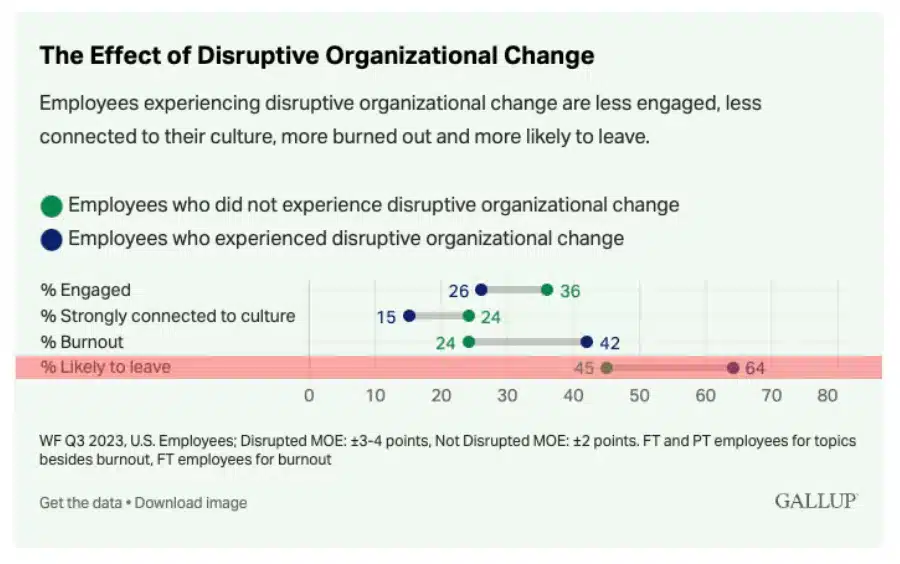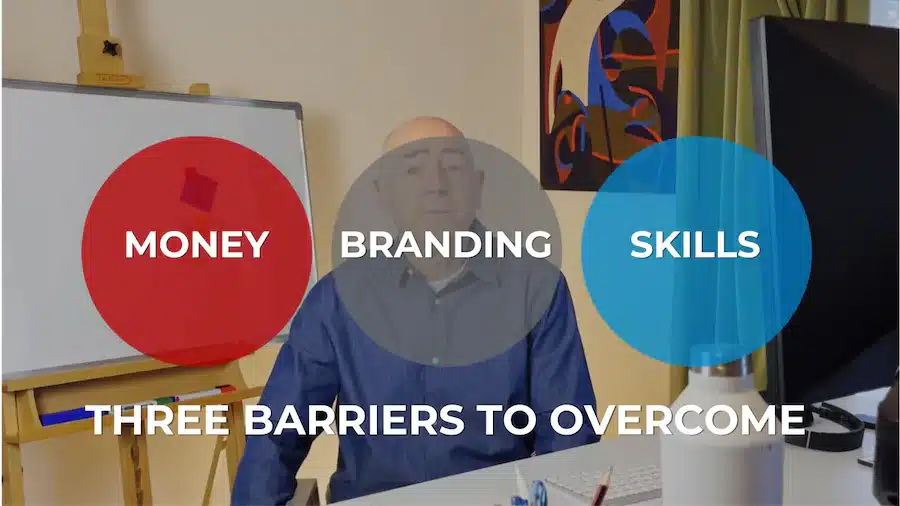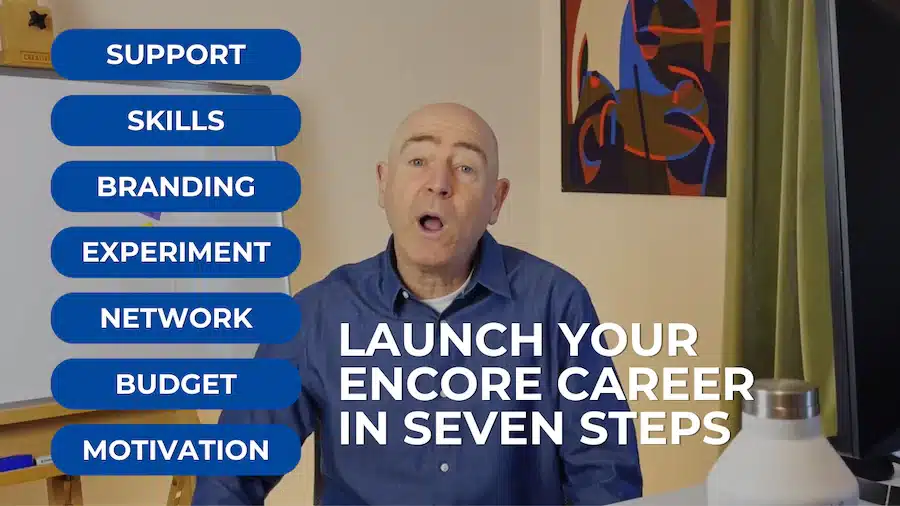Are you a 45+ leader thinking of abandoning corporate life? You’re not alone.
An Australian study has shown that the fastest growing sector of entrepreneurs is not 20-year-olds or 30 or 40-year-olds. It’s people aged 55-64. (Source: Senior Entrepreneurship in Australia)
But why is this happening? What does the research tell us?
Today, we’ll look at the SIX real reasons corporate leaders are starting their own executive coaching business or consulting practice.
It will help you decide whether to join them or not.
Plus, I’ll share the three barriers you must overcome and seven simple action steps you can take this week to make your corporate transition happen faster and easier.
Two Drives
So why are late-career professionals choosing self-employment?
There are two basic drivers – the old classics of push and pull.
There are pressures WITHIN the corporate environment that are PUSHING you out the door.
And there are your internal desires for a better lifestyle that are PULLING you toward a new future as a consultant or coach.
The “Push” Factors: Why Leave Corporate?
Here are the top three research based factors pushing leaders out of corporate life:
1 Ageism
Have you been discriminated against for your age? Have you seen it happen to others?
61% of workers globally aged 45 and older have. (Source: ihrim.org)
As companies seek younger, lower-cost employees, older workers face age-related biases.
This means fewer opportunities for advancement, exclusion from key projects, and you’re more likely to feel pressure to retire.
2 Organizational Restructuring
In a recent Gallup survey, 7 out of 10 employees in the US reported disruptive change in their organisation in the past year.
And more than 50% of senior leaders named organizational restructuring as a top reason for leaving corporate roles. They’ve had enough of the job insecurity, layoffs, diminishing roles and shrinking budgets.
Senior employees are asking themselves: Do I want to keep putting up with this?
3 Lack of Purpose
A sense of purpose is a fundamental motivator that often goes unmet in traditional corporate environments.
This occurs at two levels.
- At the big picture level. It’s the constant push to build the company’s bottom line versus broader social objectives.
- At a micro level. How do you feel when you have to perform a routine task that don’t align with their personal values?
As careers progress, the desire for meaningful work tends to grow. Do you want to feel your efforts to contribute to something larger and more personally significant?
To recap, the top three factors pushing senior leaders out the door are: Ageism, Constant restructuring and a lack of purpose.
Now let’s look at what’s pulling leaders out the door.
The “Pull” Factors: Why Consider Self-Employment?
1 Flexibility
Are you still stuck trudging into the office in the commuter rush?
In a UK-based report on workers over 50, 72% of older workers said autonomy over their working hours was the main attraction to self-employment.
This is why I love working for myself. I get to control my schedule, work remotely, and set my own pace. I can play pickleball or read a book while drinking coffee during the day, or work late. Plus, I can choose the work I do, the work I don’t do and the passion projects that inspire me – like creating this post.
2 Purpose & Impact
More than two-thirds of leaders say finding purpose drove their decision to become a consultant or coach. (Source: Oxford University Gerontology)
Further, many of those embarking on encore careers over the age of 45, said purpose was more important than financial necessity or even job flexibility.
It comes down to this: do you want the corner office or to make your corner of the world a better place?
3 Ongoing Income
Ongoing income is a financial necessity for late-career professionals. And it’s also a key reason many choose to become consultants or coaches so they can earn as much or as little as they want.
It means not relying on your savings. And it also means you can balance what income you need now and in your retirement.
For instance, I don’t think I’ll ever retire. I love the work I do so why would I stop doing it? And this means I don’t have to chase lots of money right now. Instead, I can pace myself because I know I can keep earning and saving in the years to come.
Bonus: The Value of Your Experience
As a bonus reason for being pulled toward your own business, is the value of your experience. At 45 what you know is your competitive advantage. In this previous post, I spoke about four ways to monetize your expertise and a simple action plan for you to score your first client in the next week.
To recap, the top three factors drawing senior leaders out the door are: Flexibility, Purpose and Income.
Self-Employment Over 45 – Three Barriers to Overcome
That’s seven great reasons to make the leap. And hopefully, that’s got you excited about what’s possible if you do.
But before you walk out the door, there are three crucial things you need to consider.
1 Financial Concerns
How are you going to transition from a steady salary to self-employment?
2 Personal Branding
How are you going to stand out in the consulting and market?
In other words, how are you going to get clients?
3 Technology and Skill Relevance
And what skills – especially around technology – are you going to need to develop to be a standalone professional?
For instance, are you comfortable using AI? And do you have a presence on LinkedIn?
Seven Action Steps to Launch Your Encore Career
To help you overcome these barriers, here are seven action steps you can take this week to make a career change over 45.
- Reflect on what motivates you—impact, income, lifestyle. Watch this video to explore the seven crucial lifestyle questions you need to answer. (The 7 Principles of a Location Independent Lifestyle)
- Budget – create a series of financial scenarios from best to worst and explore different strategies for flourishing. How much money do you really need?
- Leverage your professional network and decades of experience. Create a list of people you know and have worked with who may be able to help you thrive as a consultant or coach.
- Experiment with side projects or short-term contracts. One opportunity is to consider a fractional appointment where you work a role for part of your time. This guarantees regular income as you transition.
- Brand yourself: Update your LinkedIn profile, clarify your story, and articulate your unique value.
- Map your skills, especially around technology use. What do you need to learn? And if need be, hire a teenager to mentor you.
- Get support: If you want to make this transition the hard way, go it alone. But if you want to make it faster and easier, tap into coaching, workshops, or peer groups for help and support. This will help you learn faster and is more likely to lead to referrals and new clients.
Where are you at?
Making the move from your corporate role to your own executive coaching business or consulting practice could be the best thing you ever do.
But it’s not an easy decision. Hopefully, this post has helped confirm where you’re at.
The big question to ask yourself is: Which of these push and pull factors resonates with you the most? Your answer will help you confirm your motivation to stay or go.
And I invite you to comment below: what ‘push’ or ‘pull’ factors resonate most with you?
Also, you might want to share this video with your partner or colleagues to discuss your decision.
And remember to subscribe for more insights into how to become a midlife entrepreneur and enjoy your encore career.
More on Executive Transition after 45
To dig deeper into what it will take to transition from corporate life to self-employment, read these posts next:







